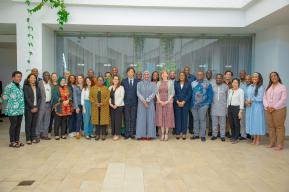News
Number of countries with open science policies has almost doubled since adoption of UNESCO Recommendation

The Open Science Outlook is the first endeavour to assess the status of open science at the global level. UNESCO has produced this first baseline study as part of its role in monitoring implementation of the 2021 UNESCO Recommendation on Open Science. In adopting this Recommendation, all Member States committed to providing national progress reports on implementation every four years. The next edition of the Outlook will, thus, be based on the first series of progress reports.
The Open Science Outlook finds that access to open science and the sharing of its benefits remain unequal across regions and disciplines. Although a growing number of countries are embracing open science, open science suffers from the same lack of equity in access to funding, skills and tools that have hindered science across the globe. To reach its full potential as a global equalizer, open science will need commitment from all.
Contrary to any other assessments, the Outlook considers the full spectrum of open science: open access to scientific knowledge (publications, data, software, source code, hardware); open infrastructure; open engagement with societal actors beyond the scientific community and open dialogue with other knowledge systems. The Outlook also highlights gaps in the available data and information.
The Open Science Outlook unveils disparities within open science that demand our immediate attention. For instance, many researchers are sharing their findings on open-access repositories, but nearly 85% of such open publication and data repositories are situated in Western Europe and North America. Africa and the Arab region account for less than 2% and 3%, respectively.
We must recognize that knowledge is diverse. Processes that create and share knowledge are diverse. In open science, we want to celebrate that diversity while increasing access and participation, so that more people can contribute to, and benefit from, science.
Open access spawning unintended consequences
In broadening access to scientific findings, open access practices have themselves spawned some unintended consequences. The UNESCO Science Report (2021) gives the following example. Some scholarly journals are replacing the cost for subscribers with an article processing charge (or publication fee) to cover the cost of the editing, typesetting, graphic design, indexing, rights management, sales and dissemination of scientific articles. This publication fee, which is borne by the author, is a heavy burden for scientists with modest means, particularly in developing countries.

The report suggests that this burden calls for alternative publishing models using shared infrastructures or different funding arrangements between universities or funding agencies and publishers that are in a position to offer sustainable alternatives to either the ‘author-pays’ or ‘reader-pays’ models.
Less attention being paid to societal engagement and dialogue
The aspects of societal engagement and dialogue are receiving comparatively less attention than open sharing of knowledge products, such as publications or data. Monitoring open science is a work in progress and actors of open science, including scientists, scholarly publishers and policy-makers, are learning along the way.
For this reason, it is essential to share different practices and learn from each other. This knowledge-sharing is also the objective of the publication: to share ideas and practices to inspire Member States to design policies and actions that really make a difference.
The desire to share practices and learn from one another inspired the theme of the joint UNESCO/CERN Dialogue on Equity in Open Science organized in tandem with the launch of the Outlook. Invited experts Dr Steven Crawford (NASA) and Dr Sünje Dallmeier-Tiessen (CERN) described how their respective institutions were applying the principles of open science in their own large-scale international research. For instance, CERN adopted its own open science policy in 2022, created by its Open Science Strategy Working Group; CERN has also designed comprehensive guidelines for sharing its research, including via the Zenodo platform where researchers across the globe can archive their materials.

For its part, the National Aeronautics and Space Administration’s (NASA) Transform to Open Science initiative is designed to support a transition within US national agencies, organizations and communities to an inclusive culture of open science. On 6 December, the initiative launched a massive open online course on open science.
Panelist Dr Tshiamo Motshegwa from the African Open Science Platform described how Africa was taking a regional approach to open science using shared infrastructure and policies. He noted the need to target Indigenous knowledge-holders in initiatives that mainstream their engagement in scientific programmes.
Dr Mouïn Hamzé from the UNESCO Open Science Steering Committee subsequently noted that, although all countries had adopted the Recommendation on Open Science unanimously in 2021, the pace of implementation had since varied. He called for strategic and coordinated action among the Arab States, with expanded awareness of the fact that open science offered benefits even during a crisis.
For his part, CEO Dr Jonathan Bagger described how the American Physical Society had changed the format of its annual conference for over 14,000 physicists by including satellite events, to facilitate knowledge-sharing to and from communities around the world.
We are facing such pressing problems in the world today that we need everybody to be able to contribute to finding a solution, without barriers. To me, open science creates and fosters an environment in which anybody in the world can participate in science.
Contact
For more information, please contact openscience@unesco.org
UNESCO's work on open science is led by its Section on Science, Technology and Innovation Policy (SC/PBS/STIP)








